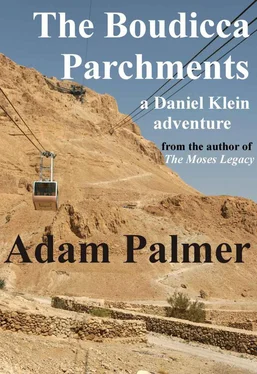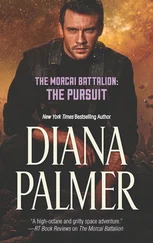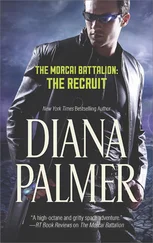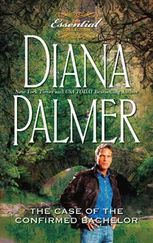Adam Palmer - The Boudicca Parchments
Здесь есть возможность читать онлайн «Adam Palmer - The Boudicca Parchments» весь текст электронной книги совершенно бесплатно (целиком полную версию без сокращений). В некоторых случаях можно слушать аудио, скачать через торрент в формате fb2 и присутствует краткое содержание. Жанр: Прочие приключения, на английском языке. Описание произведения, (предисловие) а так же отзывы посетителей доступны на портале библиотеки ЛибКат.
- Название:The Boudicca Parchments
- Автор:
- Жанр:
- Год:неизвестен
- ISBN:нет данных
- Рейтинг книги:3 / 5. Голосов: 1
-
Избранное:Добавить в избранное
- Отзывы:
-
Ваша оценка:
- 60
- 1
- 2
- 3
- 4
- 5
The Boudicca Parchments: краткое содержание, описание и аннотация
Предлагаем к чтению аннотацию, описание, краткое содержание или предисловие (зависит от того, что написал сам автор книги «The Boudicca Parchments»). Если вы не нашли необходимую информацию о книге — напишите в комментариях, мы постараемся отыскать её.
The Boudicca Parchments — читать онлайн бесплатно полную книгу (весь текст) целиком
Ниже представлен текст книги, разбитый по страницам. Система сохранения места последней прочитанной страницы, позволяет с удобством читать онлайн бесплатно книгу «The Boudicca Parchments», без необходимости каждый раз заново искать на чём Вы остановились. Поставьте закладку, и сможете в любой момент перейти на страницу, на которой закончили чтение.
Интервал:
Закладка:
Once inside the large open hole, Daniel moved what was little more than a portable grating to expose the opening that branched off. He shone his torch in to see that there was no sudden drop and then clambered in. he had to crawl on his backside for a while until it widened out. Ted followed using the same technique and apparently far more comfortably. He remembered that Ted had seemed quite comfortable in the lower viaduct in Jerusalem. And of course Ted was a very experienced archaeologist who was used to roughing it. He could compete with any survivalist if he had to.
The found themselves in a low tunnel where they could stoop, if not actually stand. Ted shone his torch too, noticing that Daniel’s was fading. In the lower aqueduct, Ted had used his more sparingly and so he had more juice left in his battery, while Daniel was paying the price for his more liberal usage.
“So this is where they hid,” said Ted.
“If Josephus’s version is to be believed.
The walls were covered in plaster, some of it from the Hasmonean period. But in other parts the plaster was no longer present and it was clear that it had been widened. There was no sudden drop, just a winding path. This was natural. If the sewage cistern was made by man then they would have found it easier to build this way than a sheer drop. The only way to make a sheer drop would have been to cut away downwards and stand on the ground they were working on.
“What was that?” Daniel blurted out.
“I didn’t say anything,” Ted replied.
“No, I don’t mean a sound. I saw something when you were waving your torch around.
Ted waved his torch again, aiming it at the same section of the wall. But this time he moved it more slowly, to give Daniel the chance to catch whatever it was he had seen before.
“That’s it! Hold it!”
Ted held the torch frozen.
“Can you move it back again… where it was a moment ago.”
“Which way?” asked Ted.
“Up and away from us… diagonally.”
Ted moved it slowly and then it became apparent to Daniel what he was looking at. Some old woven jute fabric was sticking out of a cavity in the wall. Daniel reached out for it and tugged gently. He did not want to tear or damage it. But it didn’t budge. He gripped portions of the fabric with both hands for better purchase and pulled again, gently at first, then with steadily increasing force until more of the fabric emerged.
It became clear to him at some point that what he was pulling on was a bag and that part of the reason it was jammed was because it contained solid objects and the hole in which it was embedded was not straight. Some of the objects had become stuck. He used one hand to apply pressure to the outside of the bag, moving the objects, while pulling with the other hand. Eventually the bag emerged and he placed it on the ground. He opened it carefully, in such a way that the opening was upright, even though the bag was on its side. That way he could lift items out and place them on top of the bag rather than on the ground.
Then, slowly and gingerly, he reached it and gripped an item. He was careful and delicate with his touch, because he had heard clinking sounds when he reached in and he suspected that the bag might contain ceramic materials, similar to those famous ceramic shards that had been found by Yigael Yadin’s archaeologists in the nineteen sixties — shards that bore the names of men, including Ben Yair .
But when Ted shone the light on the object he had just removed it was apparent that it was not made or clay but of silver . It was a bracelet. And not mere costume jewellery either. This was a genuine solid silver bracelet.
“Not bad for a community of ascetics,” said Daniel, with conscious irony.
“I’ll say, What else is there?”
Daniel reached in again and produced a broach. He held it up to Ted’s torch and perusal.
“Silver again?” said Daniel, seeking confirmation.
“Silver,” Ted confirmed.
Daniel put in on top of the bag. But when he produced another item from the bag, they got the shock of their lives. Because although this item too was a broach, it was a different colour from the other — a bright yellow colour.
“It’s gold !” Daniel blurted out.
Ted moved his torch close and leaned forward to make absolutely sure. There was no doubt: it was gold. At that moment, impatience got the better of Daniel. This bag did not contain delicate parchment manuscripts or fragile pottery shards. This was a treasure bag containing jewellery fashioned of precious metals. Although a manuscript would have been the greater find in his eyes, this was certainly the more unusual, and it had the added virtue of bearing out the authenticity of the deciphered contents of the Temple Mount Parchment.
Unable to contain himself any longer, Daniel seized the bottom of the jute bag, at the sides, lifted it up and emptied the contents onto the floor where he and Ted were now crouched. What fell out — no poured out — of the bag were dozens of broaches and pendants and bracelets and rings of gold and silver. When Daniel had lifted out the bag and deposited it on the ground, he had gained some sense of its weight and he estimated it to be between two and three kilograms.
Four and a half to six and a half pounds! Of jewellery! In silver and GOLD!
And in the middle of the pile was the piece that stood out from among the rest — a golden torc.
“Could that be…?”
He couldn’t even finish the sentence.
“The golden torc of Boudicca?” Ted completed.
Daniel did not have Ted’s encyclopaedic knowledge of Romano-Brittain, but he knew that torcs were a common item of Celtic jewellery and that Boudicca was said to have worn a golden torc.
Daniel picked it up and felt the weight in his hand.
“It’s solid!”
He meant solid in the sense of not hollow as opposed to solid in the sense of not plated. They didn’t do plated jewellery in the iron age, but they did do hollow torcs, especially full-sized torcs for the neck, like this one. Except that this one was not hollow. It was solid gold and that meant it was extremely valuable.
He held it up and invited Ted to shine his torch on it.
“Oh… my… God !”
Ted looked puzzled by this.
“What?”
“There’s writing on it… engraved… look.”
Ted transferred the torch to his other hand and leaned forward and looked. There was indeed some sort of writing engraved on a cylindrical shaped block in the centre of the torc. But it was not any sort of writing that Ted could read. It was not the Roman alphabet, nor the Greek one.
But it was writing that he had learned to recognize. It was the Hebrew alphabet.
“My God.”
Now the surprise had hit him too.
“But why…”
Daniel seemed to be locked in thought. He had the same question in mind as the one Ted had stifled. Even if the torc had been brought here from Britain, why would it have Hebrew writing engraved on it.
“It must have been added later,” Daniel suggested.
“But what does it say?”
Daniel peered at it again.
“The last word is Ikeni or Icheni, which I assume was the name of her tribe.”
“Yes that’s right. The Romans called them the Ikeni, But the name they called themselves was probably Icheni, from the Proto-Brythonic word ich , meaning a horse. They were the people of the horse.”
“The Hebrew letters Kaf and Khaf are virtually the same letter, depending on the context. Like I told you, later, they added dots and other symbols for vowels.”
“Okay but what’s the problem with the first bit?”
“It’s not Hebrew. Maybe it’s like the manuscripts… Proto-Brythonic written in Hebrew.”
Читать дальшеИнтервал:
Закладка:
Похожие книги на «The Boudicca Parchments»
Представляем Вашему вниманию похожие книги на «The Boudicca Parchments» списком для выбора. Мы отобрали схожую по названию и смыслу литературу в надежде предоставить читателям больше вариантов отыскать новые, интересные, ещё непрочитанные произведения.
Обсуждение, отзывы о книге «The Boudicca Parchments» и просто собственные мнения читателей. Оставьте ваши комментарии, напишите, что Вы думаете о произведении, его смысле или главных героях. Укажите что конкретно понравилось, а что нет, и почему Вы так считаете.












